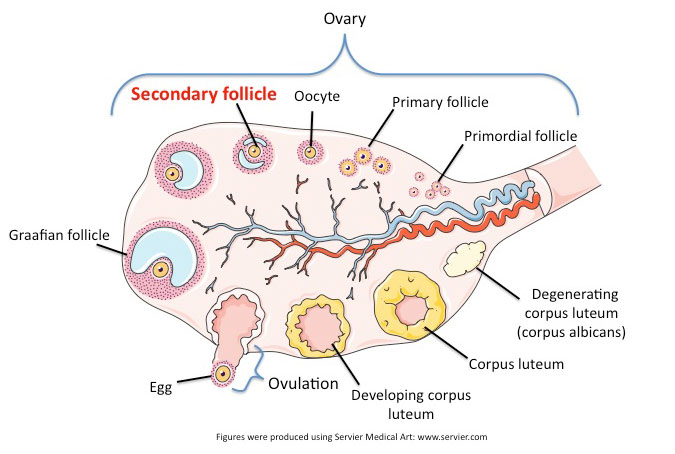Progesterone comes from the corpus luteum. Basically what happens is after you ovulate, the ruptured follicle turns into the corpus luteum which is responsible for the production of progesterone. Progesterone is an extremely important sex hormone in early pregnancy because it builds a strong uterine lining and helps maintain the lining of the uterus to help nurture a fertilized egg until the placenta takes over around the second trimester. An inadequate amount of progesterone often results in miscarriage or if there isn't a fertilized egg, your period begins.
 |
| Hormones involved in the initiation of pregnancy and the development egg cell (ovum) from follicle to embryo. |
Progesterone levels rise after ovulation, and the rise can usually be detected about a week after ovulation. According to BabyMed, progesterone levels about a week after ovulation in a nonpregnant patient are generally at least 8-10 ng/ml. Much lower levels usually mean you did not ovulate. Doctors like to see progesterone levels around 16-18 ng/ml or more in pregnant women.
Want to guess what my progesterone result came back as? 8? 6? 5? Let's try 0.46 ng/ml. This tells me two things:
1. I didn't even ovulate, which my doctor said makes no sense because of the trigger shot I took which forces you to ovulate and my ultrasound right before my IUI appeared as if the egg had already been released.
2. I have a severe progesterone deficiency or what's also known as luteal phase defect. Super.
Looks like I have the latter and I fit right in with the symptoms, which include:
Irregular periods
Not ovulating
Fibrocystic Breasts
Low Thyroid (Hypothyroidism -ding ding ding! Why didn't they make this connection before?)
Ovarian Cysts
Reduced oxygen levels in all cells (Perhaps this is why I feel like I'm dying when I run?)
Anxiety
Indigestion
Headaches and more.
Everything is interconnected. Also because I have progesterone deficiency, I have a 1000% greater chance of dying from cancer. According to the American Journal of Epidemiology, "researchers found that infertile women who demonstrated a progesterone deficiency had a premenopausal breast cancer risk that was 540% greater than that of women whose infertility was due to non-hormonal causes. Furthermore, the women with a progesterone deficiency had a 1,000% greater chance of death from all types of cancer." Happy New Year to me. Chris hugged me all night when I told him that. I'm not worried though. I know God has a plan for me.
To finish my story, I found out about all of this the Monday before Christmas. That is why progesterone is the Grinch who stole my Christmas. My family still has no idea I'm going through all this. We were all staying at my mom's house and I locked myself in the bathroom and cried and cried and cried. The Doctor called in some progesterone supplements to the nearest pharmacy just in case of the extremely rare chance I did get pregnant. I know it wasn't going to happen though. It was all I could do to bring myself to taking a pregnancy test the following Friday since I already knew it was going to be negative. And it was.
What kills me the most is knowing that there very well could have been a fertilized egg, but it didn't have the enough progesterone to nurture it to implantation. Every month my heart shatters into more pieces than the previous. This is hard, really hard.
I hope everyone had a wonderful Christmas and got to feel the spirit of Christ in their hearts.
Progesterone
levels after ovulation (midluteal, middle of the second half of the
cycle) in a nonpregnant patient are generally at least 8-10 ng/ml. Much
lower levels usually mean you did not ovulate. - See more at:
http://www.babymed.com/fertility-tests/progesterone-levels#sthash.ikBCoH97.dpuf
Progesterone
levels rise after ovulation, and the rise can usually be detected about
a week after ovulation. - See more at:
http://www.babymed.com/fertility-tests/progesterone-levels#sthash.ikBCoH97.dpuf
Progesterone
levels rise after ovulation, and the rise can usually be detected about
a week after ovulation. - See more at:
http://www.babymed.com/fertility-tests/progesterone-levels#sthash.ikBCoH97.dpuf
Progesterone
levels rise after ovulation, and the rise can usually be detected about
a week after ovulation. - See more at:
http://www.babymed.com/fertility-tests/progesterone-levels#sthash.ikBCoH97.dpuf



















